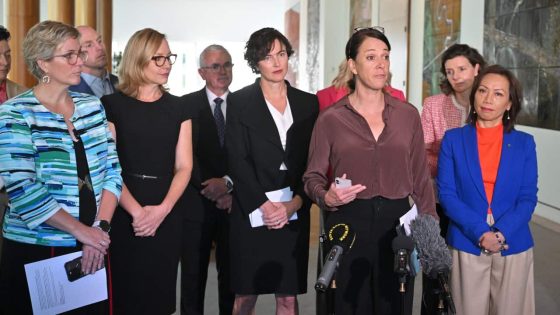Key Points
- A coalition of crossbenchers have proposed an overhaul of Australia’s political transparency legislation.
- The Fair and Transparent Elections Bill would see donations over $1.5 million banned.
- The bill doesn’t include a cap on spending for electoral campaigns.
A group of independent politicians have banded together to push for greater transparency in political donations, putting forward a bill that would see donations capped.
The Fair and Transparent Elections Bill proposes that donations over $1.5 million are banned, the threshold for donation disclosure lowered to $1,000, and includes calls for more stringent rules to make political advertising more “truthful”.
What transparency measures are currently in place ?
Australia does have rules around reporting political donations at both state and federal levels.
At the federal level, there is a disclosure regime in place which aims to make large political donations visible on the public record.
However, advocates for reform suggest these disclosure measures are inadequate and ineffective.
Deputy Program Director for Budgets and Government at the Grattan Institute, Kate Griffiths, underscored the high threshold for donations that are required to be on the record, with the federal disclosure threshold set at approximately $15,000, subject to change.
According to Griffiths, the key problem with the current disclosure practices lies in how long it takes for these donations to be made public.
“It could take up to 19 months for a big donation to be on the public record, and that’s just much too late,” she said.
“It means when Australians are actually considering policy issues or considering their vote in an election, they don’t have the information about who’s donating to the parties they’re considering voting for”.
Last month, The Australian Electoral Commission published its latest data on political donations made in the 2022/23 financial year.
Clive Palmer’s mining company Mineralogy topped the list, donating more than $7 million to Palmer’s United Australia Party in 2022/23.
Other notable donations included investment company The Cormack Foundation, which gave close to $3.5 million to the Liberal Party in donations.
Perth-based company Hadley Holdings also donated over $1 million in total to Advance Australia, the lobby group which funded campaigning against the Indigenous Voice to Parliament referendum.
Clive Palmer’s mining company Mineralogy donated more than $7 million to Palmer’s United Australia Party in 2022/23. Credit: AAP
What are the proposed changes?
One of the new bill’s key proposals is a cap on donations which would prevent any individual from donating more than approximately $1.5 million.
It would lower the disclosure threshold to $1,000, which would deliver one of Labor’s 2022 election promises, bringing the federal disclosure threshold in line with New South Wales, Victoria and Queensland.
The Bill also proposes donations should be disclosed in ‘real-time’ to mitigate lengthy delays and includes a ban on donations from certain industries and government contractors.
Independent Senator David Pocock said these measures would go a long way to improve transparency.
“We need to get the balance right … to ensure that we know where the money is coming from,” he said.
During the 2021 election, Independent Senator David Pocock challenged a misleading ad, which showed an image of him wearing a Greens party shirt. Source: Twitter / David Pocock
For Griffiths, improved transparency is essential for government accountability.
“Putting that information out in the public domain gives journalists, gives the parliament, gives the general public the opportunity to call out where they think there might be undue influence.”
The legislation also aims to put a stop to untrue, or misleading political ads.
Political marketing expert with the Australian National University Andrew Hughes told SBS News current regulation around political advertising is insufficient.
“You can really do anything you want with local advertising in Australia. Regardless of jurisdiction area … because it comes under political freedom of speech,” he said.
The bill doesn’t include a cap on spending for electoral campaigns.
For Griffiths a cap on campaign spending is where there is significant potential for further impact.
“Limiting spending during elections would limit that arms race to raise more and more funds and ultimately reduces the influence of big money in Australian elections.”
Prime Minister Anthony Albanese has said he is committed to improving transparency around political donations. Source: AAP / AAP
What’s next?
If the bill is adopted by the government, the crossbenchers have indicated they would support the legislation being passed by both houses of Parliament.
This would allow the reforms to be implemented ahead of the next election in 2025.
While Labor has been exploring electoral reform in response to a parliamentary committee tabled last year, it has not indicated which recommendations it will legislate.
Prime Minister Anthony Albanese said he is committed to improving transparency through “reform that stays, not reform that comes in then goes with changes of government.”





